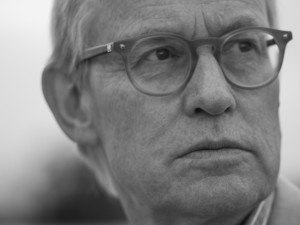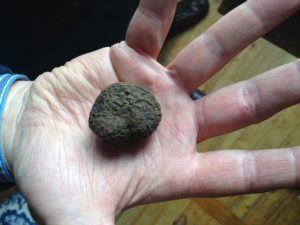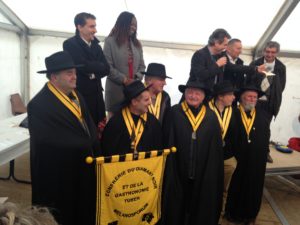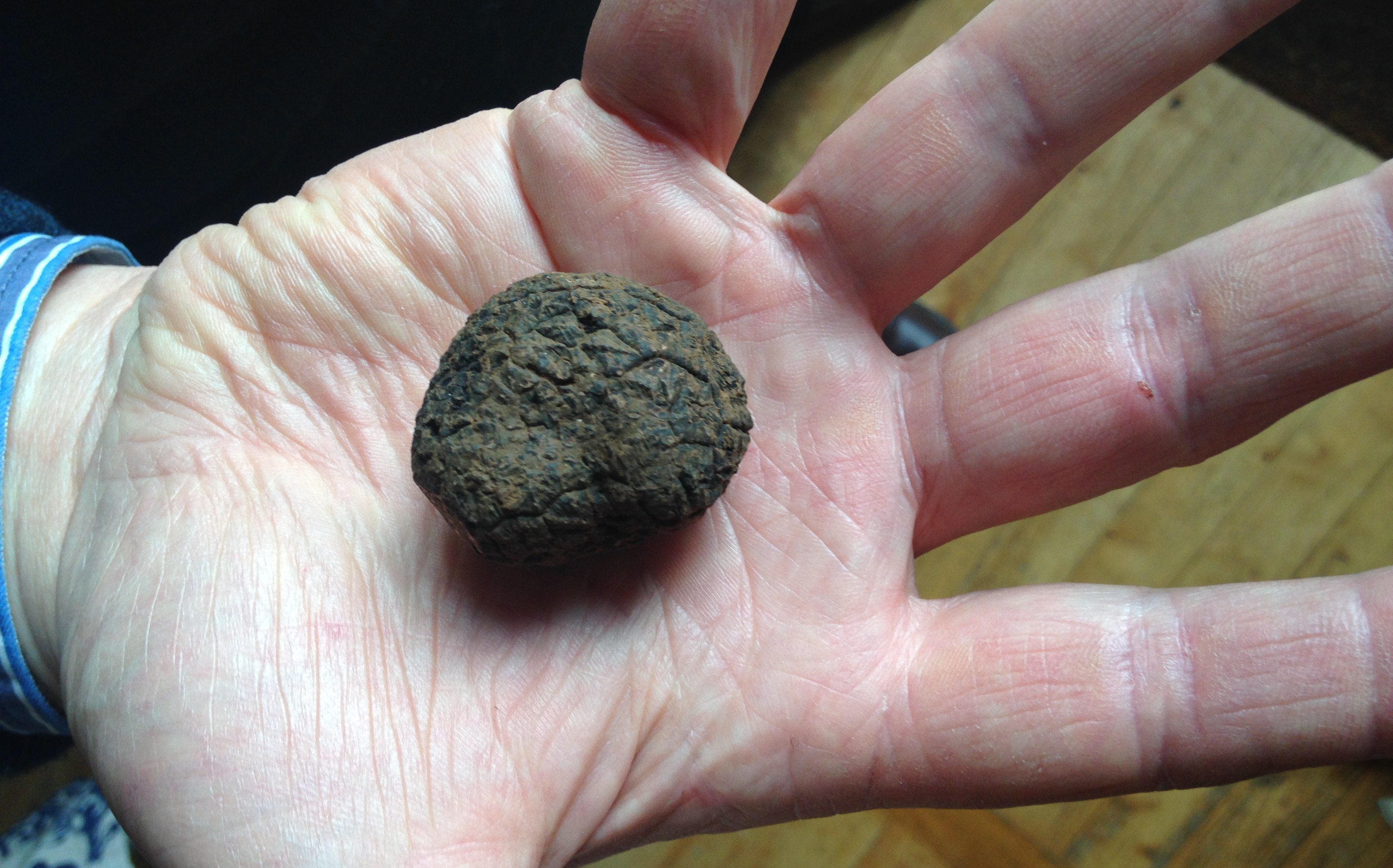18 January 2018
Truffling Thoughts
Foreigners in France.
By Richard Pooley

One of the advantages I have as a Brit living in the Lot Department of south-west France is that I am taller than most of the locals. At any crowded event – a Saturday market in the summer, an agricultural show, or, as last Sunday, a truffle fair – I can peer over the top of those in front of me and see what a stall-holder has to offer or spot someone I know. I’m 1.83 metres tall (6ft in old money) and guess that the average height of a Lotois Jean-Michel or Hugues is well below the French average of 1.74 metres (5’8”). But my wife and I and a couple of fellow British expats were not the only immigrants at that truffle fair in the village of L’Hôpital Saint Jean, 20 minutes’ drive from where I live. The marquee was graced by the presence of the new National Assembly deputy for the huge Figeac-Souillac constituency of the Lot, Huguette Tiégna. And I mean “graced”. Madame Tiégna is a tall, striking 35-year old electrical engineer who only came to France from her native Burkina Faso in 2009. Readers of my Shaw Sheet reports on the French presidential election may recall my article on her in June last year – Another Re- Word . She is a member of President Macron’s party, République en Marche, and defeated the Socialist candidate in the second round of the election, 53% to 47%.
 As I circulated the tent and admired the small baskets laden with what looked like piles of the hard work of African dung beetles but which I was assured were fine examples of Melanosporum or the Black Truffle, I watched how the locals dealt with their MP. One or two came up and asked if they could take a photograph; more wanted to ask her questions or wished to let her know what they thought about some local matter. I noticed that a journalist for, I imagine, the local newspaper La Dépêche, was listening in and taking notes. Most though ignored her. They had more important things to do: to check out the quality of the 17.5kg of truffles that had been allowed in (1.3kg had been refused entry for not meeting the high standards set by the Confrérie du Diamant Noir) and to down the champagne being offered at a very affordable price. We all applauded when she made the shortest speech I have ever heard any politician give before handing out the prize for the Most Beautiful Basket of Truffles to Monsieur Eric Tournier. Actually few heard what she or the Mayor or the head of the Confrérie said. The microphone refused to work and the crowd refused to stop talking among themselves. But nobody minded, least of all it seemed Madame Tiégna; she laughed along with the rest of us. The only person who appeared unpopular was Monsieur Francis Darnis d’Alvignac who got scant applause for winning the prize for the biggest truffle of the year (330 grams). Perhaps that “d’” was not appreciated; is he a French toff? More likely, he is regarded as too foreign; Alvignac is a once-thriving spa village 30km away on the other side of the Dordogne valley. Yet real outsiders such as us Brits and Madame Tiégna were treated with great courtesy and considerable warmth.
As I circulated the tent and admired the small baskets laden with what looked like piles of the hard work of African dung beetles but which I was assured were fine examples of Melanosporum or the Black Truffle, I watched how the locals dealt with their MP. One or two came up and asked if they could take a photograph; more wanted to ask her questions or wished to let her know what they thought about some local matter. I noticed that a journalist for, I imagine, the local newspaper La Dépêche, was listening in and taking notes. Most though ignored her. They had more important things to do: to check out the quality of the 17.5kg of truffles that had been allowed in (1.3kg had been refused entry for not meeting the high standards set by the Confrérie du Diamant Noir) and to down the champagne being offered at a very affordable price. We all applauded when she made the shortest speech I have ever heard any politician give before handing out the prize for the Most Beautiful Basket of Truffles to Monsieur Eric Tournier. Actually few heard what she or the Mayor or the head of the Confrérie said. The microphone refused to work and the crowd refused to stop talking among themselves. But nobody minded, least of all it seemed Madame Tiégna; she laughed along with the rest of us. The only person who appeared unpopular was Monsieur Francis Darnis d’Alvignac who got scant applause for winning the prize for the biggest truffle of the year (330 grams). Perhaps that “d’” was not appreciated; is he a French toff? More likely, he is regarded as too foreign; Alvignac is a once-thriving spa village 30km away on the other side of the Dordogne valley. Yet real outsiders such as us Brits and Madame Tiégna were treated with great courtesy and considerable warmth.
 The names of the organisers of the truffle fair (the charming Aurore Chaumeil and Jean-Michel Savignac), of the chef of the delicious truffle-laced lunch given to one hundred of us in the village hall (Jérôme Eugène) and of each prize-winning trufficulteur were reassuringly French. It was an occasion which fitted every positive stereotype that the typical Brit has of the typical French. It was only later that I discovered that the mayor of the village, the butt of much friendly banter during the prize-giving, is called Habib Fenni.
The names of the organisers of the truffle fair (the charming Aurore Chaumeil and Jean-Michel Savignac), of the chef of the delicious truffle-laced lunch given to one hundred of us in the village hall (Jérôme Eugène) and of each prize-winning trufficulteur were reassuringly French. It was an occasion which fitted every positive stereotype that the typical Brit has of the typical French. It was only later that I discovered that the mayor of the village, the butt of much friendly banter during the prize-giving, is called Habib Fenni.
In five years of living in this part of France, my wife and I have never met any animosity towards us foreigners, even after the Brexit referendum result. Perhaps that is not surprising. There are many people from outside France who have made their homes here – most recently Brits, Dutch, Belgians and Portuguese. We are here toute l’année and make a vital contribution to the local economy outside of the Parisian-choked months of July and August. But the willingness by many here to accept immigrants of a different race and religion, even to elect them as their representatives locally and nationally, does surprise me. It seems to be so different from the experience that friends of ours have had in other parts of France, urban as well as rural.
I have been thinking a lot about these differing attitudes towards immigration this week. President Macron went on the offensive on Tuesday in justifying his new immigration policy. Attacked in Le Monde on the same day by left-wing politicians and intellectuals for “breaking with the humanism” he once advocated and for betraying French values, he argued that those same values are under threat if France continues to allow so many migrants into the country. He is proposing that those who have come to better themselves economically, mostly from Africa, must be encouraged to return home. Only those who are genuinely in fear of their lives if they stay in countries such as Syria and Iraq should be allowed to remain in France. The problem is that the majority of migrants are in the first category and the methods used to encourage them to leave have sometimes been brutal. The police have been accused of beating up homeless migrants, destroying their few belongings and ripping blankets off those sleeping out in sub-zero temperatures.
On Tuesday Macron spoke to a police audience in Calais before moving on to a migrant centre nearby. He was listened to in silence. He told them that migrants “are human beings to whom we have a duty of humanity. You need to set a good example and respect the dignity of each individual.” He received no applause at the end.
There were over 100,000 asylum claims made in France last year, one of the highest in the EU, but few are thought to be genuine. The migrants have been living for months, sometimes for more than a year, in CAOs (Welcome and Orientation Centres) or, if considered genuine asylum seekers, CADAs (Reception Centres for Asylum Seekers). There are over 400 CAOs, set up all over the country in the aftermath of the clearing of the “Jungle” at Calais. But many migrants have fled these centres (37% of the total, according to one report I read), convinced that their claim for asylum will be rejected.
I met one of these escapees last summer while he was staying for a fortnight in the house of some friends of friends in the village of Gagnac further up the Dordogne valley. Elvis is a 36-year old Nigerian car mechanic. He became head of his family after the death of his mother two years ago and headed across the Sahara to Libya to find a job which would allow him to send money home. He was also getting away from some gangsters in Benin City with whom he had fallen out; he showed me the scars from their machetes. A friend in Tripoli persuaded him to use his savings to get to Lampedusa. He ended up at a CAO in Figeac (the town where Madame Tiégna lives) but had to leave there because of the violence that he had suffered at the hands of a Nigerian woman who had had her baby taken from her (and at the mouth; he showed me the bite marks among the machete ones). He had started a French course but learned little other than oui. He was living from day to day, unsure if any other villagers would take him in at the end of his fortnight’s stay. He soon moved on to I don’t know where.
Macron’s critics include many in his own République en Marche Party. But not, it seems, Huguette Tiégna. I read an interview she gave to a newspaper in Burkina Faso on 4 December 2017 when on a visit, with Macron, to her home country. She did not pull her punches about conditions in France. “A lot of African migrants are suffering even more than they were in their own countries. Our welcome centres are saturated and cannot provide proper care. In the light of this tragic situation, the President announced in September a complete reform of our welcome policy. We are putting in place a system which makes it easy for people to return to their countries of origin, working alongside our cousins in Germany.” Pressed on this she went on to say that “immigration is a shared problem, shared between European countries and African countries. We must find a solution together.”
The truffle fair at L’Hôpital Saint Jean is one of a number of truffle-related events being staged in the area. The next one is on Sunday, a walk among the oak trees under which the truffles can be found (with luck and a competent dog), ending, of course, with a repas gastronomique sur le thème du diamant noir. Who is organising it? The new Lot – Burkina Faso Association. What, you ask, has the lush Lot got in common with an impoverished semi-desert African country? Surely there are no truffles in the latter. There aren’t. But maybe this is a tiny step towards solving Europe’s immigration problem. Madame Tiégna is doing her not inconsiderable bit to build relations between her deeply traditional yet open-minded French constituents and the citizens of her sub-Saharan homeland. Why not? Surely there can be no solutions until people in Africa and Europe have a proper understanding of each other. Would Elvis have come all the way from southern Nigeria to a small village in France if he had known it was not some modern-day Eldorado? He didn’t even know that the French don’t speak English.


